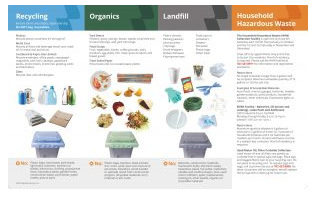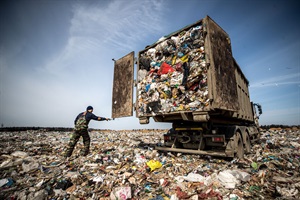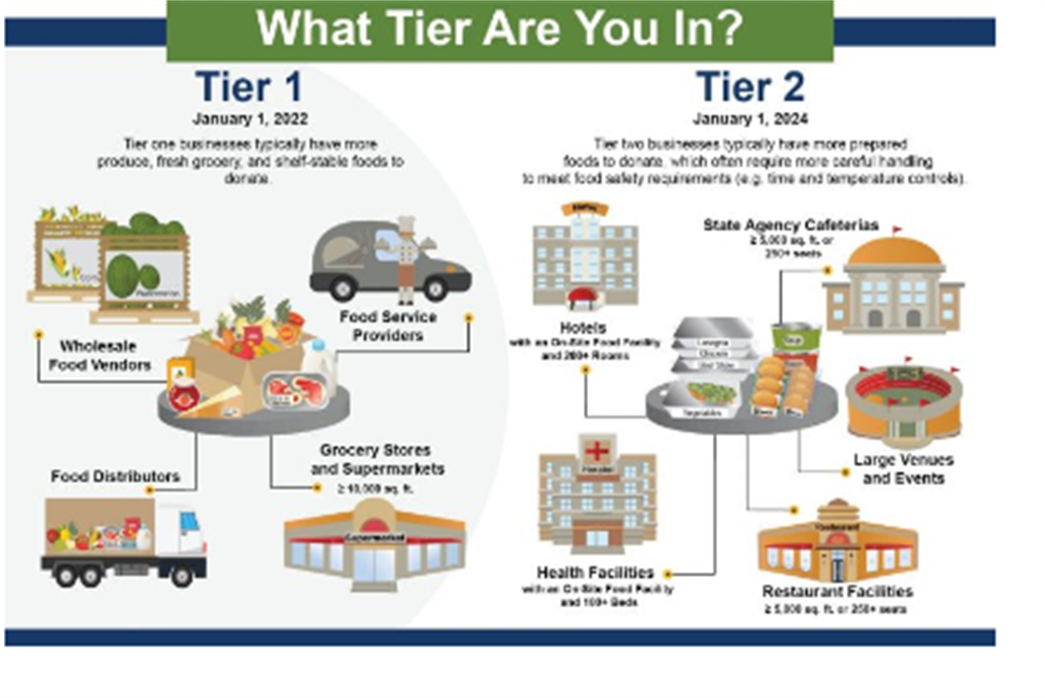
Wondering what goes where? Check out: www.irecyclesmart.com or visit Republic Services’ webpage.
Need assistance with finding a local food pantry and/or produce giveaway information? Click here. Take advantage of FREE produce giveaways on Fridays - twice per month at the Kroc Center and twice per month at Dan O. Root Elementary School. No income or ID verification. Don't forget to put any leftover produce organic waste into your green lid cart!
*** Are you a resident or a business looking for Food Recovery Organization (FRO) information? Contact one of the following organizations: ***
In Suisun City, we have a three (3) bin sorting system for managing debris disposal - Monday is the trash day for all residents in Suisun City:
- Green lid cart = all food scraps*, used pizza boxes, Chinet plates, etc.
- Blue lid cart = general recycling (bottles, cans, clean cardboard, clean paper, etc.)
- Grey/brown lid cart = regular trash for the landfill
*NOTE: Residents may use compostable plastic bags to gather and dispose of their organic waste into the green lid cart. Any compostable bag MUST include the following logo – otherwise the bag will contaminate and ruin the entire load, defeating the purpose of diverting organic waste from the landfill:
Some brand examples of plastic compostable bags that include the BPI logo and are acceptable to be used in the green lid container are:
- BioBag
- Bio-Bosi
- SUPERBIO
- ANECO
You can view the current Customer Service Guide from Republic Services which includes more information on what can and can’t be recycled and provides updates on available services to Suisun City residents.

** Looking for some quick FAQs and information regarding SB 1383? CLICK HERE **
In September 2016, the Governor set methane emissions reduction targets for California (SB 1383 Lara, Chapter 395, Statutes of 2016) in a statewide effort to reduce emissions of short-lived climate pollutants (SLCP). California must:
- Reduce organic waste disposal 50% by 2020 and 75% by 2025.
- Rescue at least 20% of currently disposed surplus food by 2025 for people to eat.

Organics like food scraps, yard trimmings, paper, and cardboard make up half of what Californians dump into landfills each year. Reducing short-lived climate super pollutants, like organic waste, will help the current climate crisis.
Organic waste that goes to landfills emits greenhouse gas and other pollutants:
- 20% of the state’s methane, a climate super pollutant 84 times more potent than carbon dioxide.
- Air pollutants like PM 2.5, which contributes to health conditions such as asthma.

Timeline for Implementation of SB 1383
January 1, 2022 – CalRecycle’s regulations to meet the organic waste reduction targets take effect and are enforceable on this date.
January 1, 2024 – Jurisdictions may impose penalties for non-compliance on regulated entities subject to their authority.
January 1, 2025 – By this date, the state must achieve a 75% reduction in the level of statewide disposal of organic waste from the 2014 level. In addition, not less than 20% of currently disposed edible food must be recovered for human consumption.

Who’s Affected?
How to Participate in Organic Waste Programs to be Compliant with SB 1383.
RESIDENTS
Use Existing Organic Waste Cart: Residents can participate in organics programs provided by the Franchised service provider, Republic Services offers the disposal of green waste (yard waste) and organic waste (food waste) in the green lid cart you currently use. NOTE – Compostable bags are not currently allowed. Please check back for updates as this is expected to change in early 2022.
Self-Haul: Subscribing to trash, green waste (organic waste) and recycling services in Suisun City is mandatory unless granted an exemption from the City of Suisun City.
Use a Backyard Compost Bin: Compost your green material, food soiled paper (uncoated), and food scraps at home. Learn more about backyard composting.
MULTIFAMILY COMPLEXES
State Law 1383 (SB 1383) additionally requires multifamily complex with five (5) or more units to recycle and/or divert all generated organic waste from the landfill starting January 1, 2022.
“Organic waste” includes food, green material, landscape and pruning waste, organic textiles and carpets, clean wood, non-coated paper products (Chinet paper plates, other non-wax coated paper products), food soiled paper towels, and printing and writing paper.
Multifamily complexes can meet the new SB 1383 requirement by choosing one or both of the following options:
- Divert and recover your organic waste from the landfill.
- Subscribe to regular organics collection service with the City franchise hauler, Republic Services; and/or
- Self-haul organics to a local facility. A record must be kept showing the amount of organic material delivered to each facility. An Annual Diversion Report Form must be submitted each year by March 1st for the previous year. All records shall be subject to inspection.
- Records must include delivery receipts and weight tickets that indicate the amount of material in cubic yards or tons.
- Provide organics and recycling service to employees, contractors, tenants, and customers.
- Provide organic waste collection for employees and tenants.
- Collection service must be arranged so that access to an adequate number, size, and location of containers is available to customers, employees, and tenants.
- Annually provide educational information about the legal requirements to compost and recycle. In addition, education must be provided on how to properly sort the three waste streams into the correct containers. Please note, for new tenants, this information must be provided before or within 14 days of move-in.
- Businesses and property managers are responsible for ensuring compliance with the SB 1383 requirements. This means ensuring tenants and employees are properly sorting all generated organic waste into the correct recycling container.
- For all outdoor and indoor containers, the container bodies or lids shall conform to the following color scheme: gray/black for landfill, blue for recycling, and green for organic waste. In addition, containers shall have labels with graphic images to indicate primary materials accepted and prohibited.
COMMERCIAL ENTITIES
- Divert your organic waste from the landfill.
- Subscribe to regular organics collection service with the City’s franchise hauler, Republic Services; and/or
- Self-haul organics to a local facility. A record must be kept showing the amount of organic material delivered to each facility. If businesses choose this recycling method, businesses must submit their Annual Diversion Report Form to the City each year by March 1st for the previous year. All records shall be subject to inspection.
- Records must include delivery receipts and weight tickets that indicate the amount of material in cubic yards or tons.
- Provide organics and recycling service to employees, contractors, tenants, and customers.
- Collection service must be arranged so that access to an adequate number, size, and location of containers is available to customers and employees.
- Small indoor containers for organic waste and recyclable items must be provided in all areas where garbage containers are present, except for restrooms.*
- For all outdoor and indoor containers, the container bodies or lids shall conform to the following color scheme: gray/black for landfill, blue for recycling, and green for organic waste. In addition, containers shall have labels with graphic images to indicate primary materials accepted and prohibited. Businesses and property managers are responsible for ensuring compliance with this requirement.
- Annually provide educational information about the legal requirements to compost and recycle. In addition, education must be provided on how to properly sort the three waste streams into the correct containers. Please note, for new tenants, this information must be provided before or within 14 days of move-in.
- Periodically inspect recycling and organics containers and inform employees if contamination is found and take steps to correct the behavior.
- Tier One and Tier Two commercial entities (defined in the graphic below) are required to donate the maximum amount of excess edible food to feed people.
- A contract or written agreement must be maintained with food recovery service(s) or organization(s) to pick-up or receive edible food.
- A record must also be kept indicating all types of food being donated, pounds donated per month, frequency of donations, and the contact information of the contracted food recovery service(s) and/or organization(s).
- Generators shall not intentionally spoil food that can be recovered.
- Large venues or large event operators that do not provide food services, but allow for food to be provided, shall require food facilities operating on site to comply with the above organics diversion and food recovery requirements.
* Denotes requirements from which multifamily residential dwellings are exempted.
For more information from CalRecycle on frequently asked questions for Commercial Business requirements for Organic Waste disposal/recycling check out -> https://www.calrecycle.ca.gov/recycle/commercial/organics/faq
Additional information is also available through the following links to an eight-page educational brochure that provides additional inforamtion:
English -> SOLANO-HiRes-RGB
Spanish -> SOLANO-Spanish-R1(1)
Reference: SB 1383 Regulations §§ 18984.7, 18984.8, 18984.9, 18984.10, 18986.1, 18986.2, 18988.3, 18991.3, 18991.4
